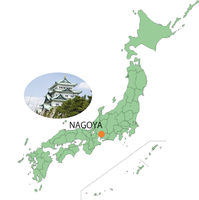Features
Features
Find Nagoya University! -with International NU Researchers-
- ツイート
- 2017/03/03
- Institute of Transformative Bio-Molecules (ITbM)
- Graduate School of Information Science
- Graduate School of Engineering
- Dr. Asraa Ziadi
- Dr. Kirsi Salorinne
- Dr. Amine Bouibes
- Dr. Karim Nissar
Nagoya University is actively promoting interactive human exchange in order to further strengthen its research and education, cultivate talented individuals, and develop an international human network. As of FY2015, there are more than 2,100 foreign students and 1,000 foreign researchers representing approximately 90 countries.
Expected to achieve international breakthroughs, four postdoctoral researchers from Nagoya University participated in a round-table discussion, held on January 23, 2017, and openly discussed their experiences at Nagoya University.
The discussion was conducted by Ayako Umemura (NU Research)
& Ayako Miyazaki (ITbM)
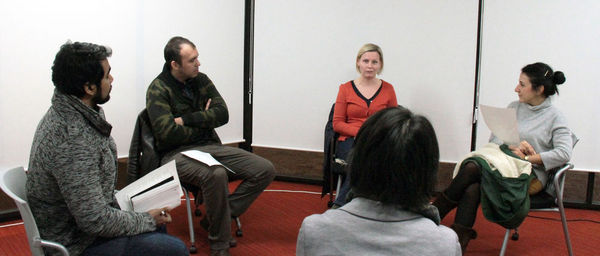
Expected to achieve international breakthroughs, four postdoctoral researchers from Nagoya University participated in a round-table discussion.
Introduction of the Attendees
Dr. Asraa Ziadi:
 I was born in Iraq, after which I lived in several different countries until my family settled down in Sweden when I was 12 years old. I went to Spain for my PhD and also participated in a short exchange program in Japan. So, basically, I have been traveling all for my career! Currently, I am working at the Institute of Transformative Bio-Molecules (ITbM), Nagoya University, as a postdoctoral researcher in organic chemistry.
I was born in Iraq, after which I lived in several different countries until my family settled down in Sweden when I was 12 years old. I went to Spain for my PhD and also participated in a short exchange program in Japan. So, basically, I have been traveling all for my career! Currently, I am working at the Institute of Transformative Bio-Molecules (ITbM), Nagoya University, as a postdoctoral researcher in organic chemistry.
Dr. Kirsi Salorinne:
 I was born and raised in Finland. I have also been traveling since I was an undergraduate student in chemistry: I spent one year in the US, and then traveled to Germany and Canada for some collaborative research. Here, I work as a postdoctoral researcher in the laboratory of organic synthesis and materials chemistry with a Canadian Principal Investigator (PI) at ITbM.
I was born and raised in Finland. I have also been traveling since I was an undergraduate student in chemistry: I spent one year in the US, and then traveled to Germany and Canada for some collaborative research. Here, I work as a postdoctoral researcher in the laboratory of organic synthesis and materials chemistry with a Canadian Principal Investigator (PI) at ITbM.
Dr. Amine Bouibes:
 I was born in Morocco. I moved to France for my undergraduate studies, after which I remained there to obtain my PhD. I have expertise in materials design, and I am currently working as a postdoctoral researcher at Graduate School of Information Science (Graduate School of Informatics from April 2017).
I was born in Morocco. I moved to France for my undergraduate studies, after which I remained there to obtain my PhD. I have expertise in materials design, and I am currently working as a postdoctoral researcher at Graduate School of Information Science (Graduate School of Informatics from April 2017).
Dr. Karim Nissar:
 I was born in Bangladesh. I obtained my Ph.D in Microelectronic Reliability from the University of Malaya in 2015. Currently, I am a postdoctoral research fellow at the Graduate School of Engineering. I work at Prof. Nakazato’s laboratory for electrical characterization of nanomaterials.
I was born in Bangladesh. I obtained my Ph.D in Microelectronic Reliability from the University of Malaya in 2015. Currently, I am a postdoctoral research fellow at the Graduate School of Engineering. I work at Prof. Nakazato’s laboratory for electrical characterization of nanomaterials.
About ITbM
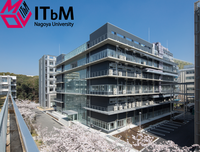 The Institute of Transformative Bio-Molecules (ITbM) is an international research center established in April 2013 at Nagoya University. The goal of ITbM is to develop bio-functional molecules that change the way we live, i.e. “transformative bio-molecules”, through the dynamic collaboration between chemistry and animal/plant biology. ITbM has many researchers from overseas and is equipped with Mix Labs to promote interdisciplinary research. For more details, please visit ITbM.
The Institute of Transformative Bio-Molecules (ITbM) is an international research center established in April 2013 at Nagoya University. The goal of ITbM is to develop bio-functional molecules that change the way we live, i.e. “transformative bio-molecules”, through the dynamic collaboration between chemistry and animal/plant biology. ITbM has many researchers from overseas and is equipped with Mix Labs to promote interdisciplinary research. For more details, please visit ITbM.
About the Graduate School of Information Science (Graduate School of Informatics from April 2017)
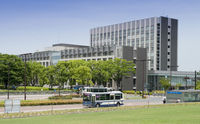 The Graduate School of Information Science has created a comprehensive education and research system in the field of information, vigorously promoting joint industry-government-academia research and fund raising from external sources. For more details, please visit the Graduate School of Information Science (Graduate School of Informatics from April 2017).
The Graduate School of Information Science has created a comprehensive education and research system in the field of information, vigorously promoting joint industry-government-academia research and fund raising from external sources. For more details, please visit the Graduate School of Information Science (Graduate School of Informatics from April 2017).
About the Graduate School of Engineering
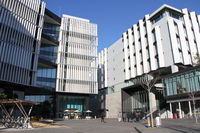 The Graduate School and School of Engineering have gained competitive research funds totaling 4.75 billion yen and a high reputation as evidenced by the many prizes and awards given to its 152 researchers and 215 students (FY2015). In addition, the school has produced two Nobel laureates: Prof. Isamu Akasaki (Physics in 2014) and Prof. Hiroshi Amano (Physics in 2014). For more details, please visit the Graduate School of Engineering.
The Graduate School and School of Engineering have gained competitive research funds totaling 4.75 billion yen and a high reputation as evidenced by the many prizes and awards given to its 152 researchers and 215 students (FY2015). In addition, the school has produced two Nobel laureates: Prof. Isamu Akasaki (Physics in 2014) and Prof. Hiroshi Amano (Physics in 2014). For more details, please visit the Graduate School of Engineering.
NU Research:
All of you have had rich international experiences.
So, how did you decide to work at Nagoya University, out of the many other great universities all around the world?
World-Leading Research at Nagoya University
 Asraa:
Asraa:
When I was a graduate student, I attended a presentation by Prof. Itami, the Director of ITbM, at a conference. I was impressed with his research, then I asked him if I could work in his lab through a study exchange program. So, I did! Through the experience, I had clearly decided where I wanted to work for my postdoc career.
 Kirsi:
Kirsi:
In my case, I visited Prof. Crudden’s research group in Canada as a postdoc. However, she also runs a lab as an overseas PI at ITbM and offered me an opportunity to conduct my research in Japan. To be honest, I neither knew much about Nagoya University, nor had an idea about the city of Nagoya at that time. I was more excited than ever, to come to Japan!
 Asraa:
Asraa:
Actually, I also had no idea where the city of Nagoya was located. When I looked at the map, I found out that it was at the center of Japan, or the heart of the important industrial areas of Japan.
For centuries, Nagoya has been acknowledged as a sustainable society; however, more recently, it has been recognized for its strong manufacturing industries. It is especially well known as the home of the Toyota Motor group. For more details regarding amazing Nagoya, please visit the Nagoya Convention & Visitors Bureau. (Nagoya University established a Cooperative Agreement with the Nagoya Convention & Visitors Bureau in 2014.)
Campus Environment of Nagoya University
 Karim:
Karim:
When I was looking for my next position as a postdoc, I contacted many well-known research groups in my research area by email. I received several replies, one of which was from Nagoya University. Out of curiosity, I checked the university rankings on the QS World University Rankings® database. At that time, I realized that Nagoya University was ranked as one of the Top 100 universities.
According to the QS World University Ranking® in 2016,
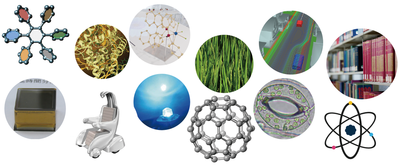 Nagoya University was ranked in the Top 100 universities for six subjects: Engineering-Chemical; Agriculture & Forestry; Biological Sciences; Chemistry; Materials Science; and Physics & Astronomy.
Nagoya University was ranked in the Top 100 universities for six subjects: Engineering-Chemical; Agriculture & Forestry; Biological Sciences; Chemistry; Materials Science; and Physics & Astronomy.
 Amine:
Amine:
I had, more or less, no idea about Japan. However, I came here because Prof. Nagaoka at Nagoya University is well known in my research field. In addition, the interesting point is that his research group conducts international collaborations. I also based my final decision on the university’s ranking.
 Karim:
Karim:
International collaborative research conducted by the research group that I currently belong to was also a determinative point for me.
I also recognized that Nagoya University produces a number of publications and it shows robust growth, as represented by its Nobel laureates. Besides, before starting my postdoc career, I visited Nagoya University and was impressed by its stimulating campus environment.
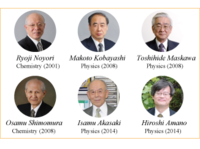 About the Nobel Laureates from Nagoya University
About the Nobel Laureates from Nagoya University
Since entering the 21st century, 14 Japanese researchers have received a Nobel Prize. Among them, six were graduates of or have been affiliated with Nagoya University as faculty members during their careers.
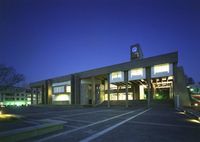 About the Toyoda Auditorium at Nagoya University
About the Toyoda Auditorium at Nagoya University
The Toyoda Auditorium was donated by the Toyota Motor Industry Corporation (currently known as the Toyota Motor Corporation) in 1960 for the dual purpose of promoting and developing education and science. Since then, it has been widely regarded as the proud symbol of Nagoya University.
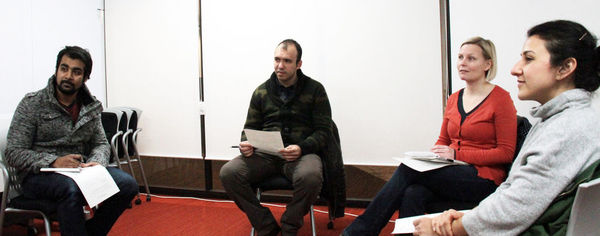
NU Research:
After arriving in Nagoya or Japan, what did you find through your experiences?
Life Styles
 Asraa:
Asraa:
Culture shock is unavoidable in Japan! Everything in Japan is so different from what we know in the world, as seen, for example, from the innovative reforms to the cleanliness of the toilets. To have such interesting experiences, I knew that a postdoc career in Japan would be a great opportunity.
 Karim:
Karim:
I used to stay in Malaysia where I regularly experienced the Chinese culture. I had obviously thought that Japan would be quite similar, but it was not.  I have many good impressions of Japan, one of which is that public transportation is always punctual. This has greatly helped my punctuality at meetings. In fact, I am always in the room about five minutes before the start of any meeting.
I have many good impressions of Japan, one of which is that public transportation is always punctual. This has greatly helped my punctuality at meetings. In fact, I am always in the room about five minutes before the start of any meeting.
 Kirsi:
Kirsi:
Japanese culture is fascinating! You need to have a chance to explore this country since it is so unique. For foreigners to stay in Japan, some simple and basic introductions are required to make the quality of life better because Japanese way of doing things is sometimes very different like the long working hours.
 Amine:
Amine:
Although it depends on the people or laboratories, it is a well-known fact that Japanese tend to work longer than those in other countries. I also found that they have a clear purpose, which enables them to concentrate on their work. On the other hand, it is important to create and expand human networks outside of working hours.
Working Environment
 Karim:
Karim:
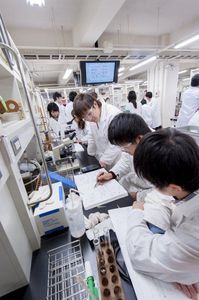 Regarding the working environment, I am happy to use brand new, high performance machines in my research. With these equipments, I can conduct my research more efficiently and effectively.
Regarding the working environment, I am happy to use brand new, high performance machines in my research. With these equipments, I can conduct my research more efficiently and effectively.
 Asraa:
Asraa:
This may be a unique phenomenon of Japanese universities. In most cases, experimental instruments are not owned by the university, but they belong to the laboratory. Here, we need specialists or technicians for the machines, although the students in the laboratory are knowledgeable about how to use such equipment. I have to learn how the machines work on my own from engineering point of view.
 Amine:
Amine:
In order for individual laboratories to own such expensive machines, I found out that the researchers of Nagoya University have acquired significant research funding. One problem is that the instruction manuals are only written in Japanese.
Languages
 Karim:
Karim:
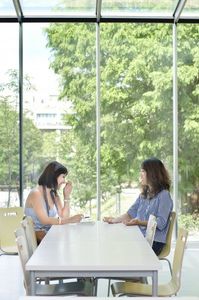 In Japan, learning Japanese is beneficial. Here, even the official documents that require our signatures are only prepared in Japanese or partially translated in English. However, the university staff and administrators help us translate such documents.
In Japan, learning Japanese is beneficial. Here, even the official documents that require our signatures are only prepared in Japanese or partially translated in English. However, the university staff and administrators help us translate such documents.
 Asraa:
Asraa:
Knowing the Japanese language is important for enjoying everyday life in Japan. Compared to the internationalization of other countries, I feel that Japanese are not used to having international people. Especially for using English, I want them to become more confident: I was surprised when Japanese apologized to me for making a simple grammatical error in English.
 Kirsi:
Kirsi:
I suppose that Japan is now becoming more internationally oriented, and it will succeed as long Japanese gain more self-confidence in speaking English.
In the universities, if language barriers are overcome, international researchers can become more independent and supportive to students and colleagues, just like their Japanese counterparts. As members of Nagoya University, it is important we equally support one another.
NU Research:
Thank you very much for all your wonderful comments!
Year after year, Nagoya University has increased the number of international collaboration projects. Accordingly, education and research in English and internationalization of administrative staff have intensified. We are eagerly improving the university’s atmosphere from an international perspective!
More to read?
This discussion is also featured on ITbM's news: The title "A peek into research life in Japan ~ An international group of researchers at Nagoya University discuss their experiences about research in Japan~."
Want to share your opinions?
PhD students, postdocs, and young researchers at Nagoya University meet frequently and exchange their opinions. For more information, please visit NUECRA.
Interested in studying abroad at Nagoya University?
You can learn more about Nagoya University’s classes and course materials at Nagoya University OpenCourseWare (NU OCW). Some of the schools offer the Global 30 (G30) International Program.
For academic exchange and short-term programs, Nagoya University offers Nagoya University Program for Academic Exchange (NUPACE); Nagoya University Short-Term Japanese Language Program (NUSTEP); and Nagoya University Summer Intensive Program (NUSIP).
For more information, please contact the International Education & Exchange Center.
NU Research
(English)


